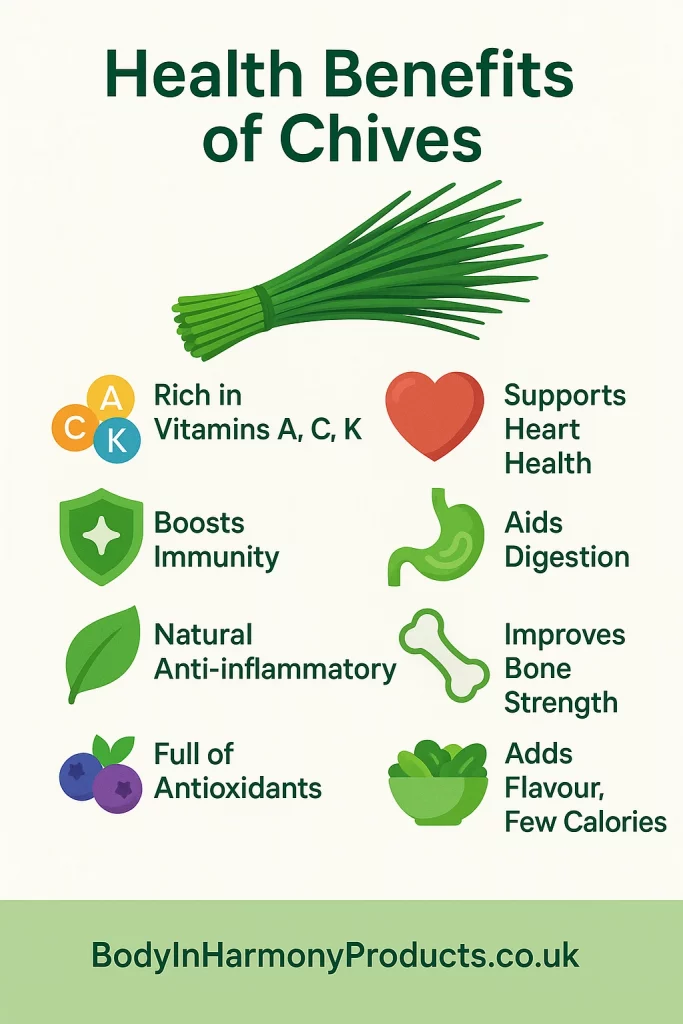Are Chives Good for You? Discover the Hidden Power of This Herb
You’ve seen them sprinkled on soups and baked potatoes—but are chives good for you, really? Surprisingly, yes. These mild, onion-flavoured herbs are more than just garnish. They’re packed with nutrients and are easy to add to meals without much fuss. Whether you’re after better flavour or better health, chives are worth a second look.
Let’s explore the nutrition, health perks, and how to use them every day—without overthinking it.
The Nutrient Boost You Didn’t Expect
Chives may look delicate, but they deliver a surprising number of nutrients. They’re rich in vitamin K, a nutrient that supports strong bones and helps your blood clot properly. In fact, just one tablespoon offers around 25% of your daily vitamin K needs.
You’ll also find vitamin A and C in every small serving, both of which contribute to a healthy immune system. On top of that, chives offer small amounts of calcium, folate, and magnesium—important for nerve and muscle function. And all this comes with fewer than two calories per tablespoon.
They’re a simple way to add more goodness to your meals, especially if you’re trying to eat healthier without making drastic changes.
Health Benefits: Are Chives Good for You? Absolutely.
Chives contain powerful antioxidants like quercetin and allicin. These compounds can help protect your cells and reduce inflammation. Regularly including chives in meals may also support heart health by helping lower cholesterol and blood pressure.
Their mild antibacterial properties could support digestion too. Some studies suggest that chives might help reduce bloating and even support your gut health, though more research is needed.
So, if you’ve been wondering, are chives good for you, the answer is yes—for your heart, your immune system, and even your gut.
Can They Support Weight Goals Too?
Trying to cut back on calories or salt? Chives can help. Because they’re naturally low in calories and full of flavour, they’re a great substitute for salty seasonings or heavy sauces. Just a sprinkle can transform a bland dish into something more satisfying.
Their fibre content is modest, but every little bit helps when you’re aiming to feel fuller for longer. They also add a fresh bite without any guilt.
This makes them ideal for anyone following a balanced or weight-conscious diet.
Everyday Cooking: Are Chives Good for You in the Kitchen?
Absolutely. Chives work with almost anything—scrambled eggs, soups, salads, stews, and even dips. You don’t need to cook them; just chop and sprinkle.
For best results, add them at the end of cooking to preserve their flavour and nutrients. They’re especially good in yoghurt-based dressings or sprinkled over roasted vegetables.
Start with a teaspoon, taste, and adjust. They’re mild enough to suit most palates but punchy enough to notice.
Are There Any Risks to Know About?
Generally, chives are safe for most people. However, they do contain vitamin K, which may interact with blood-thinning medication. If you’re on these meds, it’s best to check with your doctor before increasing your intake.
Some people might experience mild stomach upset if they consume large amounts. But for everyday use in normal servings, chives are unlikely to cause any issues.
Like most herbs, they’re best enjoyed in moderation as part of a varied, balanced diet.
Conclusion: Small Herb, Big Impact
So, are chives good for you? Without a doubt. They’re a tiny herb with mighty benefits—rich in vitamins, antioxidants, and flavour. Easy to grow, even easier to use, and perfect for boosting meals without the calories.
Next time you’re chopping ingredients, don’t forget the chives. A handful of these green stems can go a long way towards supporting your health while making your food taste fantastic.
Chives are often overlooked, yet they are a simple herb that adds both flavour and gentle nutritional value to everyday meals. As part of a natural approach to eating, small additions like this can support a more mindful relationship with food. Linking chives back to Herbs and spices for wellbeing helps place everyday herbs within the wider picture of balanced living, where natural ingredients support health without relying on heavily processed alternatives.





